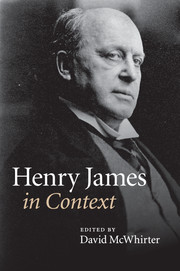Book contents
- Frontmatter
- Contents
- List of Illustrations
- Notes on Contributors
- Preface
- Abbreviations
- Chronology
- Part One Life and career, times and places
- Part Two Historical and cultural contexts
- Chapter 9 Aestheticism and Decadence
- Chapter 10 Authorship
- Chapter 11 Children
- Chapter 12 Consumer culture
- Chapter 13 Cosmopolitanism
- Chapter 14 Courtship, marriage, family
- Chapter 15 Ethics
- Chapter 16 Language
- Chapter 17 Law
- Chapter 18 Manners
- Chapter 19 Media and communication technologies
- Chapter 20 Modernism
- Chapter 21 Money and class
- Chapter 22 Museums and exhibitions
- Chapter 23 Nationalism and imperialism
- Chapter 24 Print culture
- Chapter 25 Psychology
- Chapter 26 Race
- Chapter 27 Realism and naturalism
- Chapter 28 Sexualities and sexology
- Chapter 29 Social sciences and the disciplines
- Chapter 30 Things
- Chapter 31 Time
- Chapter 32 Travel and tourism
- Chapter 33 Urbanity
- Chapter 34 Visual culture
- Chapter 35 Women and men
- Chapter 36 Work
- Part Three Reception
- Further reading
- Index
- References
Chapter 15 - Ethics
Published online by Cambridge University Press: 05 August 2014
- Frontmatter
- Contents
- List of Illustrations
- Notes on Contributors
- Preface
- Abbreviations
- Chronology
- Part One Life and career, times and places
- Part Two Historical and cultural contexts
- Chapter 9 Aestheticism and Decadence
- Chapter 10 Authorship
- Chapter 11 Children
- Chapter 12 Consumer culture
- Chapter 13 Cosmopolitanism
- Chapter 14 Courtship, marriage, family
- Chapter 15 Ethics
- Chapter 16 Language
- Chapter 17 Law
- Chapter 18 Manners
- Chapter 19 Media and communication technologies
- Chapter 20 Modernism
- Chapter 21 Money and class
- Chapter 22 Museums and exhibitions
- Chapter 23 Nationalism and imperialism
- Chapter 24 Print culture
- Chapter 25 Psychology
- Chapter 26 Race
- Chapter 27 Realism and naturalism
- Chapter 28 Sexualities and sexology
- Chapter 29 Social sciences and the disciplines
- Chapter 30 Things
- Chapter 31 Time
- Chapter 32 Travel and tourism
- Chapter 33 Urbanity
- Chapter 34 Visual culture
- Chapter 35 Women and men
- Chapter 36 Work
- Part Three Reception
- Further reading
- Index
- References
Summary
Reading James’s fiction within the context either of his ethical concerns or the ethical implications of the critic’s chosen reading practice is scarcely new. Yet contexts change, whether to break from or overlap with previous contexts. In the contemporary intellectual environment, post-modern thinking has exerted a considerable, if varied, set of influences on literary studies, so it seems at once apposite and challenging to engage with the ways in which the writing of Emmanuel Levinas, Jacques Derrida and Zygmunt Bauman may illuminate often familiar ethical puzzles or dilemmas. The focus will fall on three of James’s later novels, since such a consolidated grouping offers chronological and stylistic coherence, as well as opening for investigation of highly allusive texts that interweave language with resonant silences. The aim is not to force James’s production into conformity with current theories, but to facilitate an enabling dialogue, through which the philosophical and the fictional partners come to refresh, elucidate and enrich each other. Of course, this enquiry needs to take cognisance of Lee Mitchell’s caution that a novel such as The Golden Bowl may, in its complex metaphoricity, function principally as a literary endeavour, thus rendering the ethical aspect subordinate – perhaps only marginally relevant. As he argues, James’s late works tend to resist paraphrase, making it difficult to find convincing grounds for an ethical interpretation. Yet this experiment in uncovering ethical affinities should, none the less, be equally guided by those commentaries which over the past forty years have discerningly identified a range of intriguing moral orientations in James’s fiction.
- Type
- Chapter
- Information
- Henry James in Context , pp. 161 - 170Publisher: Cambridge University PressPrint publication year: 2010



